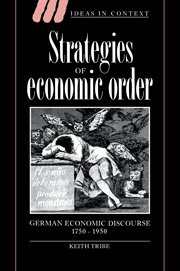Book contents
- Frontmatter
- Contents
- Acknowledgements
- 1 Introduction: From Cameralism to Ordoliberalism
- 2 Cameralism and the science of government
- 3 Die Vernunft des List. National economy and the critique of cosmopolitan economy
- 4 Historical Economics, the Methodenstreit, and the economics of Max Weber
- 5 The Handelshochschulen and the formation of Betriebswirtschaftslehre, 1898–1925
- 6 The Logical Structure of the Economic World – the rationalist economics of Otto Neurath
- 7 Capitalism, totalitarianism and the legal order of National Socialism
- 8 The genealogy of the Social Market Economy: 1937–48
- 9 The New Economic Order and European economic integration
- Bibliography
- Index
- Ideas in Context
7 - Capitalism, totalitarianism and the legal order of National Socialism
Published online by Cambridge University Press: 14 September 2009
- Frontmatter
- Contents
- Acknowledgements
- 1 Introduction: From Cameralism to Ordoliberalism
- 2 Cameralism and the science of government
- 3 Die Vernunft des List. National economy and the critique of cosmopolitan economy
- 4 Historical Economics, the Methodenstreit, and the economics of Max Weber
- 5 The Handelshochschulen and the formation of Betriebswirtschaftslehre, 1898–1925
- 6 The Logical Structure of the Economic World – the rationalist economics of Otto Neurath
- 7 Capitalism, totalitarianism and the legal order of National Socialism
- 8 The genealogy of the Social Market Economy: 1937–48
- 9 The New Economic Order and European economic integration
- Bibliography
- Index
- Ideas in Context
Summary
Fifty years after its first appearance, Franz Neumann's Behemoth remains unsurpassed as the classic study of National Socialism. This is not for want of scholarly attention to the subject. The NS-Zeit, brief as it was, retains its power to generate debate and controversy, assuring in turn a continuing and high level of academic scrutiny devoted to the period. Historians and social scientists have played a prominent and public role in recent controversies, as evidenced by the Kujau affair and the Historikerstreit. Despite this ready association of scholarly investigation and popular interest in the phenomenon of National Socialism, Behemoth, written in New York during 1941, endures as the most successful attempt to outline its structure and dynamics.
As sometimes happens, however, Behemoth's analysis was so readily, and widely, accepted that little attention was paid to its possible limitations or deficiencies. It was quickly assumed that the text was heavily indebted to Marxist categories and concepts, and when a German translation was eventually published during the 1970s it seemed natural to add an afterword placing Behemoth in the context of recent Marxist discussions of Fascism. Certainly Neumann describes National Socialism as ‘Totalitarian Monopoly Capitalism’; but it should be noted that when he investigates the structure of National Socialism he chooses to do so in terms of the institution of property, invoking Karl Renner.
- Type
- Chapter
- Information
- Strategies of Economic OrderGerman Economic Discourse, 1750–1950, pp. 169 - 202Publisher: Cambridge University PressPrint publication year: 1995

